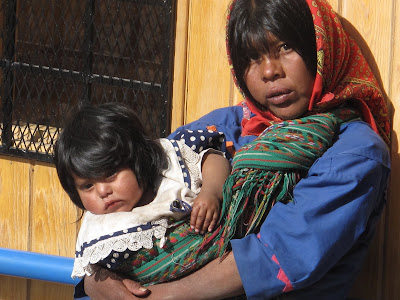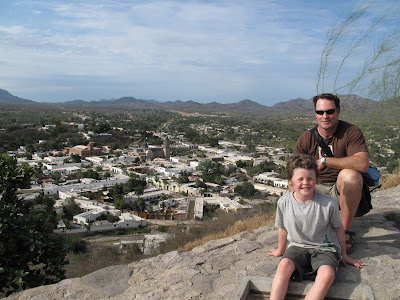



Creel, Chihuahua
Considering that we had only budgeted 48 hours for this trip, we once again set the alarm (so wrong on a trip like this!) in order to maximize our enjoyment of the area. It was cold here this morning (-2 Celsius - it's all relative) and we did not pack quite enough clothing. A hearty breakfast at the Lodge, followed by booking a tour through the hotel. We scrambled through town, where most things were still closed, to find a convenience store where we could buy the fixings for a bag lunch.
When we returned to the hotel we found that our guide was to be Salvador, the fellow who had shown us how to operate the gas stove in our room the night before. We did not know at the time how lucky we were to have him to chauffeur us around for the day. Before leaving the hotel, Liz noticed that Salvador was carrying to the tour vehicle a couple of bags of groceries similar to the ones on offer inside the lobby for donation to the local Tarahumari Indians. We had assumed that money would be given to the hotel who would arrange distribution of the groceries at a later time. Salvador explained that instead, if you bought the bag of groceries, you got to distribute them yourself through the course of the tour. We committed to two bags (for a total of about $12, or 120 pesos).
Our first stop was to La Cueva de Sebastian (Sebastian's Cave), which is named after the patriarch of the currently resident family who set up shop there 60 years ago. These people literally live in a cave. Small rooms are walled off with brick and about four generations live right in or around the cave. They grow corn and make crafts (baskets, bags, clothing and wood carvings). The tourist visits are a means of generating some income. We handed over some of the groceries (cooking oil, bags of salt, flour and sugar, soap) and bought a couple of gewgaws.
It was mindblowing to see people still living in such primitive conditions. Salvador explained that those who still retain much of their traditional lifestyle apparently exist in happiness, but the Tarahumari experience many of the same problems as our own indigenous peoples. Alcoholism claims many men, and increasingly more women, who venture into the towns. The Spanish began with Catholic evangelism in the 1600's, but the Tarahumari burnt down all the churches and killed the priests on at least three different occasions until the Jesuits arrived in the 1700's. There is currently a form of residential school program in place in which the children arrive on Monday morning and sleep over at the school until Friday afternoon. This allows the government to medicate them and teach them all Spanish and introduce them to the wonders of television. But these are people who have successfully resisted cultural assimilation for centuries and they really are different.
We moved along to see some cool rock formations, result of the fact that this part of the world is the product of 70 million years' worth of volcanic activity. They are known as the mushroom and frog rocks- do I need to describe them to you? We encountered more Tarahumari, selling more baskets/knicknacks, and distributed some more of our groceries. It feels good being able to give something, as the giving of money only encourages dependency. As well, we were giving exclusively to the women, who were the ones actually doing much of the handiwork and the selling. It is interesting that the women continue to dress in the traditional manner. Apparently the Tarahumari are swamped with the charitable donation of clothing, which the men adopt readily but not the women.
Next stop was the San Ignacio Mission, where we encountered a couple of other tours, one on mountain bikes and the other on horseback- both would be very cool ways to see this country. The front of the church is decorated with Tarahumari symbols representing the Sun, the Moon and the peyote bud, all three important aspects of their native religion. Of course, when the Jesuits started proselytizing about the Holy Trinity, the Tarahumari realized that maybe there was something to this Catholic religion and that maybe the priests weren't such bad guys after all. The Tarahumari meet at the church every Sunday and after much singing and dancing (not really in line with the gravity of the Catholic service) meet in the courtyard out front to conduct business. Grievances are aired and adjudicated and other matters of social significance are decided. There is a recognized "head man" and his deputy, as well as law enforcement officers, who represent the executive and administrative arms of Tarahumari social law. For all their their primitive lifestyle, they have a remarkably advanced spiritual and social life.
Salvador was extremely knowledgeable about all this, quite congenial, and best of all, English speaking! This is not easy to come by in the backwoods of Mexico. He also proved to be an able driver, when our next stop (after the photo op at "Elephant Rock") took us to a waterfall. We paid the tariff to the Tarahumari at the gate, then set out on a road through the woods that can barely be described as that. The hotel's Suburban, despite Salvador's light hand at the wheel, took a beating, as did the occupants. We were greeted by, you guessed it, more Tarahumari women selling more gear. We continued to hand out groceries and took the 247 step staircase to the base of the falls. Lunch on the tailgate of the Suburban beside the river consequently tasted very good.
The tour took us to another mission with a museum and then to a beautiful lake. We increased our repertoire by buying a bunch of candies which we could distribute to the swarms of children that descended on us at each stop. We finally returned to the hotel 2 hours later than scheduled, due to the fact that Salvador had allowed us to dillydally somewhat and give the boys some time to climb and run. In all, a most satisfying day, and profoundly affecting for the adults. We tried to transmit some of our wonder to the boys at how different life for the Tarahumari is, as well as the beauty of the place in which they live, but like most children they seem to accept it all as just the way things are. Which in a way may be the more reasonable thing to do.
-Remy












































